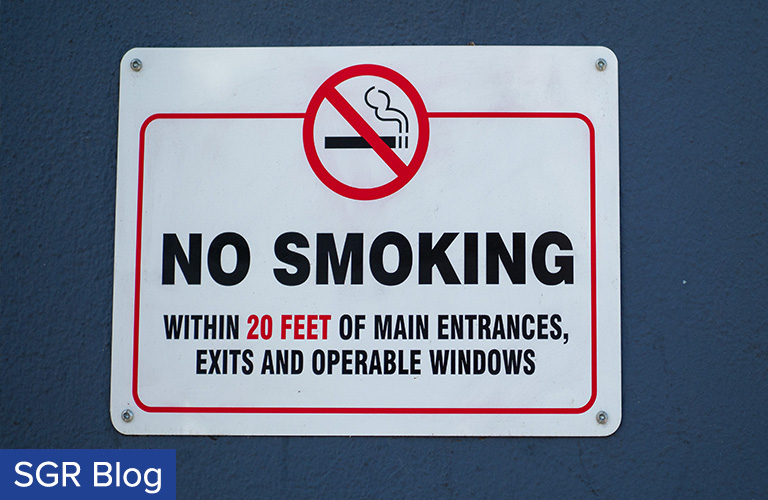
A Central Park West condominium sued the owner of a first-floor unit and her son for breach of contract and nuisance. The Board wanted to enjoin them from smoking marijuana and making excessive noise in their unit. At the outset, the Supreme Court issued a preliminary injunction that prohibited defendants from smoking marijuana and permitting marijuana smoke and excessively loud noises from infiltrating into the common areas and other units of the condominium. And several months later the Court addressed the application for a permanent injunction.
The by-laws prohibited nuisance within the condominium property, as well as improper, offensive, or unlawful uses of the property. The by-laws also empowered the Board to adopt and amend the House Rules governing “the details of the operation and use of the property.”
The House Rules provided that residents and their families, employees, or visitors shall at all times respect the quiet enjoyment of the premises by neighbors and other residents by keeping music and other noise-generation activities to a level that does not intrude upon adjacent apartments or common areas. And the House Rules also contained a section, entitled “Second-Hand Smoke”, which permitted owners and residents to smoke in their units only if they ensured that the smoke did not vent into adjacent apartments or common areas.
The Board demonstrated that the defendants smoked marijuana in their unit and permitted others to do so. Approximately seventy one complaints were made after November 3, 2013. The smoke emanating from the defendants’ unit infiltrated into other units and common areas of the condominium. And the smoke and odor offended and annoyed other residents and visitors.
Another unit owner submitted an affidavit stating that the smoke and odor has exacerbated headaches. The managing agent submitted an affidavit reporting an email from a unit owner advising her that a potential buyer of his apartment had backed out “because of the constant smell of marijuana and loud music emanating from my neighbor.” The Board also demonstrated that other residents complained on approximately thirteen occasions about excessively loud music and other noise from defendants’ unit. Defendants were sent cease and desist letters and were fined at least twenty times for smoke and noise violations. And both defendants, despite being warned of possible legal action, promised to stop the smoking and noise but failed to do so.
The Court found that the Board made the requisite showing for a permanent injunction: (1) the existence of a violation of a right presently occurring, or threatened and imminent; (2) it had no adequate remedy at law; (3) it will suffer irreparable harm absent the injunctive relief; and (4) the equities were balanced in its favor.
The Board established both a breach of contract and common-law nuisance. The violation of a condominium’s by-laws constituted a breach of contract. Defendants breached their obligation under the by-laws by engaging in a practice that was a source of annoyance to other owners and interfered with other residents’ and occupants’ peaceful possession of their units. And the Board also established that defendants violated the by-laws which expressly prohibited nuisances, and created a common-law private nuisance, because their persistent smoking of marijuana and/or permitting others to do so in their unit, as well as the excessively loud music emanating from their unit, in violation of the by-laws, constituted an intentional, unreasonable, and substantial interference with a neighbors’ right to use and enjoy their units and the common areas of the condominium.
The Court noted that exposure to second-hand smoke from a neighboring apartment does not give rise to cause of action to recover money damages. Thus, injury caused by the smoke conditions arising from the defendants’ conduct was not compensable by money damages. As a result, the Board was found to have demonstrated that irreparable injury, requiring injunctive relief, would result should the smoke condition be permitted to persist. And, while money damages might be available to compensate a person for a nuisance created by loud noises, injunctive relief was not precluded where, as was the case here, such damages were inadequate to abate the nuisance.
And the Court also found that the balance of equities clearly favored the Board. The detriment to defendants by granting the injunction and directing them to cease permitting marijuana smoke and excessively loud noises from infiltrating into the common areas and other units of the condominium was far outweighed by the detriment that would inure to the other unit owners by reason of exposure to the smoke and excessive noise if the court refused to grant the injunction.
The Board also sought to hold defendants in contempt and for sanctions for failure to comply with the Court’s order that preliminarily enjoined defendants from permitting smoke and excessively loud noises from infiltrating from their unit into common areas or other units in the condominium. After the issuance of that order, thirteen complaints about marijuana smoke and odors and six complaints about loud noises were logged.
The Board established that a lawful order of the Court was in effect, clearly expressing an unequivocal mandate; that the order was disobeyed; defendants had knowledge of its mandate and made no attempt to comply. And the Board and residents and employees of the condominium had been prejudiced by the defendants’ noncompliance. The other unit owners continued to suffer the nuisances created or permitted by defendants.
The Court found defendants to be in contempt. And ordered as a penalty that defendants be fined in the amount of the legal fees and costs incurred by the Board in obtaining the preliminary injunction and in bringing the application for contempt.
Lessons learned: Successfully prosecuting a claim for private nuisance by a unit owner in a residential cooperative or condominium usually requires creating and maintaining a meticulous record of abuse. And where, as was the case here, the record so maintained established a long history of abuse, despite admonitions to cease and desist, the Court was not reluctant to issue an injunction and impose sanctions.

